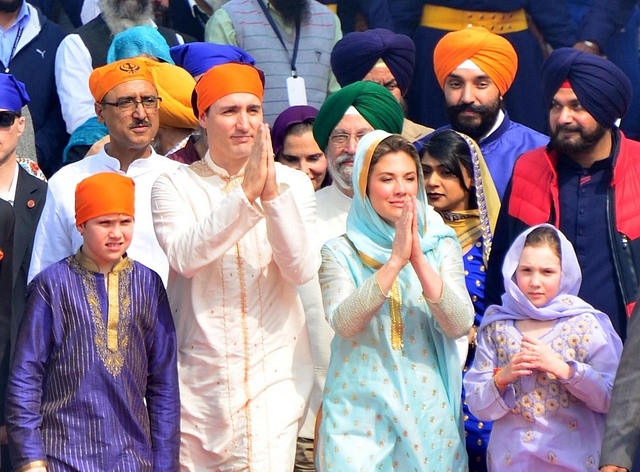
The One Thing Modi Should Ask From Trudeau When They Meet; It Will Salvage An Otherwise Insipid Visit
It bodes well for the government to get down to some serious business with Trudeau, quantum computers, for instance.
Alright, so the arrival at Palam of the photogenic couple — Prime Minister of Canada and Mrs Justin Trudeau with three young kids in tow, was all but ignored by the Bharatiya Janata Party (BJP) government. And, perhaps, his meeting and talks with the Indian Prime Minister, Narendra Modi, deserved to be pushed back to virtually the last day of his six-day trip to India to show just how disillusioned Delhi is with Ottawa’s mollycoddling of sections of the half-million strong Sikh immigrant community that, while enjoying the salubrious climes of Vancouver, Montreal and Toronto, dream of a Punjab separated from India and emerging as they hope as the Republic of Khalistan. They’d have to be daft and have a lot of “khali sthan” between their ears to believe that will come to pass. So, that’s not the point.
What is, is whether having rightly shown displeasure, Modi will continue rubbing Trudeau’s nose in the Delhi dust to when the Canadian media travelling with their PM declares the visit a complete washout, and Canadian press commentators begin seeding a new grievance, this time on the Canadian side, about Trudeau being egregiously insulted by the Indian government, which is bound to escalate to a full souring of bilateral relations.
Or, will Modi be the statesman and, after mentioning the obligatory issue of the Canadian leader needing strongly to discourage his small Khalistani support base, get down to brasstacks in their official talks on Friday, 23 February, and get something meaningfully strategic out of Trudeau.
There’s one thing highly strategic that Modi might care to put on top of his list of ask from his Canadian counterpart. There are not many computer hardware firms in the world who have mastered quantum computers. There’s a Canadian company, D-Wave, that makes Q-computers. Modi should ask that D-Wave be permitted by Ottawa to set up three or four Q-computer complexes in India and have the Q-computer architecture uploaded to the Cloud, as IBM has done with its Q-computer design, so that young Indians and specialised Indian agencies who cannot now access these very advanced computers of tomorrow and find themselves handicapped in their work, begin to gain competence in this new technology. It will be very good business for D-Wave, earn a pretty export dollar for Canada, and Modi can make clear that Delhi will treat this gesture as the Canadian government making amends.
For Justin Trudeau this would make ample sense as well. After all, the strained Indo-Canadian cannot be sustained for long, and is bad international politics from Ottawa’s point of view. India is a huge big market and to alienate Delhi would be to lose, for the Canadian companies, access to a rich market, and even imperil such custom as firms like Bombardier generate in India sales (of their metro coaches, for instance).
The problem is how many people in the Indian government and, specifically, in the Prime Minister’s Office and in the National Security Adviser’s office, filled to the gills with old style policemen from Doval’s IPS cadre, even know what Q-computers are or, for that matter, quantum communications, or quantum satellites, or anything quantum? If all these worthies are innocent of even passing knowledge of this technology, who is going to suggest to Modi that he ask for it?
Incidentally, just how strategic and still pretty rare is specialist knowledge on Q-computers, etc may be gauged from the fact that there only three persons in all of India able to write algorithms for them, one of them working — and I mentioned this in a past blog — in China, helping that country gain algorithm-writing competence and otherwise assisting it to become a quantum computing power based on his pioneering research in the field.
This article was first published on Bharat Karnad's blog, Security Wise, and has been republished here with permission.